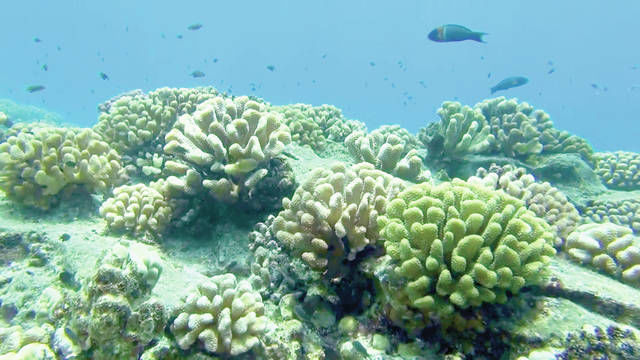LIHUE — Education and conservation are priorities for those who study Kauai’s coral reefs, and they’re hoping a recent $715,000 federal grant awarded to the state will amp up both. The National Oceanic and Atmospheric Administration awarded the grant to
LIHUE — Education and conservation are priorities for those who study Kauai’s coral reefs, and they’re hoping a recent $715,000 federal grant awarded to the state will amp up both.
The National Oceanic and Atmospheric Administration awarded the grant to the state of Hawaii as part of a cooperative agreement between NOAA and Hawaii’s Division of Aquatic Resources, according to a Thursday announcement from Sen. Mazie Hirono (D-Hawaii).
The money will be used to fund activities critical to the management and protection of Hawaii’s coral reefs, according to the announcement, with a focus on the priority areas of West Maui and South Kohala.
Representatives from DLNR did not have a breakdown of how much money will go toward Kauai’s reefs by press time, but representatives said the Division of Aquatic Resources is grateful for the continued support from NOAA’s Coral Reef Conservation Program.
“Coral bleaching events in 2014 and 2015, which killed approximately 50 percent of the coral reefs in Hawaii, makes it imperative that we focus on actions we can take locally to make our reefs more resilient to climate change and to help our reefs recover,” said Bruce Anderson of DAR.
Creating new rules to protect fisheries resources, educating the community on those rules, and enhancing enforcement are some of the goals for using the money.
“This will include the training of judges on the science behind the coral reef protection laws. We will also continue to support on-the-ground projects in the priority watersheds to fence out ungulates and to design and implement storm water control projects,”Anderson said.
Improved management of coral reef ecosystems, support greater capacity to enforce coral reef protections, promote increased understanding of the key threats to reef ecosystems at priority sites, and continue progress toward implementing the objectives of the Hawaii Coral Reef Strategy are also part of the goal for the money.
“We are thrilled that the government is finally paying attention to our reefs; reefs are like the rainforests to biodiversity,” said Gordon LaBedz, vice chair of Kauai Surfrider Foundation.
Those key threats are mostly human-generated, LaBedz said, and it’s the responsibility of humans to mitigate the impacts.
Educating the next generation is just as important as conservation, according to Katy Muzik of Kapaa, a marine biologist.
“We need to acquaint young people with the history and culture of the marine environment, the present crises, global warming and military, and the future solutions,” Muzik said.
Pollution from land — including human bacteria, pesticides, pharmaceuticals and plastics — make up much of the environmental problems, Muzik said.
Her solutions include installing Advanced Treatment Units (ATUs) instead of septic systems and cesspools, eating local, detoxifying streams and canals, and restoring water diversions.
Focusing on solutions to the degradation of the coral reefs is important because of the hundreds of millions of dollars they bring to Hawaii’s economy annually, Hirono said.
“It is critically important that we invest in the science that will help us respond to the very real threat of climate change, maintain a healthy coral reef ecosystem, and recover from recent serious bleaching events,” Hirono said.
While it’s encouraging for conservationists and scientists that money is going toward coral reef conservation, they said they are hoping at least some of it lands on Kauai.
“I hope all the money doesn’t go to West Maui and South Kohala,” Muzik said. “I hope it will provide funds for education, especially for local high school students, to become immersed in the ocean.”


